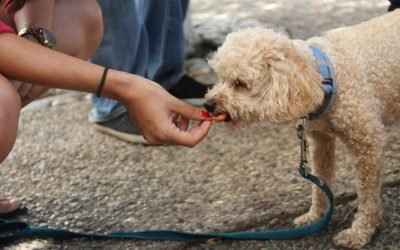Health Issues with French Bulldogs?
The French Bulldog, a small dog breed with a friendly and lovable personality, is quickly rising in popularity around the world. The reason is obvious to anyone who has ever had a French Bulldog as a pet. They get along well with other pets and kids and are known for their endearing personalities and adaptability.

They are also more manageable in terms of exercise requirements. Unfortunately, French Bulldogs as a breed are prone to a wide variety of illnesses.
Unexpected veterinary costs may arise as early as 2 or 3 years of age due to these health problems, in addition to having a major effect on the quality of life of a pet. Knowing about the genetic problems caused by the selective breeding of the Frenchie for their adorable flat face, small, pointed ears, and stocky appearance is important whether you already own a Frenchie or are thinking about bringing one into your home.
When it comes to the health issues with French Bulldogs, the most common problems are:
FRENCH BULLDOG ALLERGIES
All dog breeds, like people, can develop allergies. As a breed, Frenchies are predisposed to developing food and environmental allergies throughout their lives. Your Frenchie may be showing signs of an allergy if they exhibit any of the following behaviors:
- Excessive itching or licking, especially of the paws.
- Watery eyes, ear infections or sneezing.
- Development of red/raw patches of skin or paws.
- Diarrhea, bloody or smelly stools, vomiting, abdominal pain, weight loss, in appetence or lethargy.
FRENCHIE SKIN FOLD DERMATITIS
The cute skin folds on a Frenchie’s face are part of their endearing appearance, but they can also be a source of Skin Fold Dermatitis, a common skin condition. This type of dermatitis, as the name suggests, can also show up in other folds of skin, such as the armpits, neck, and vulva. Owners should keep an eye out for these health issues with French Bulldogs with following symptoms of skin fold dermatitis as:
- The development of redness and sores in and around affected areas of skin.
- Excessive scratching, biting, or itching in and around folded areas of skin.
PYODERMA
Frenchies often develop bacterial skin infections, also known as pyodermas, due to the creases in their skin that make them so attractive. Infected wounds (pyoderma) are the result of a cut or scratch. Fortunately, pyodermas respond well to antibiotic creams or pills prescribed by your vet.
Symptoms of pyoderma include:
- Itching surrounding the wound.
- Development of redness, hair loss, crusting, or excessive discharge from the wound
OTITIS EXTERNA
The Frenchie’s flat face, which is highly prized, unfortunately often results in narrower ear canals. Due to their small ear canals, Frenchies are unable to keep their ears clean on their own, so they tend to get warm and wet. This creates a breeding ground for yeast and bacteria, which can cause otitis externa (ear infection).
Symptoms of ear infections include:
- Excess wax in the ears while cleaning them.
- Excessive ear scratching or head shaking.
- Internal ear redness or scrapes.
CONJUNCTIVITIS (PINKEYE) AND CORNEAL ULCERS
Due to their flat faces, Frenchies are more likely to contract conjunctivitis than other breeds of dog. Conjunctivitisis, also known as pink eye, is one of the common health issues with French Bulldogs.
Eye problems in French Bulldogs can be brought on by allergens, other irritants, or dry eye syndrome. Frenchies are especially vulnerable to eye injuries like ulcers and scratches because of their unusually large, prominent eyes.
Watch out for these symptoms that may indicate your Frenchie has conjunctivitis or corneal ulcers:
- Squinting, blinking, or pawing at the eyes.
- Red or swollen eyes, as well as discharge from the eyes.
We have dedicated an entire article to Frenchie eye problems. See Eye Problems in French Bulldogs.
BRACHYCEPHALIC AIRWAY SYNDROME (BAS)

Those adorable, squished faces of Frenchies cause a condition called Brachycephalic Airway Syndrome (BAS). Their airways become blocked because their soft palates are too long for their short muzzles. Narrow or stenotic nostrils are another symptom of BAS, which can make it difficult to take in air through the nose. Frenchies breathing problems are very common.
Signs of Brachycephalic Airway Syndrome (BAS) include:
- Vomiting, retching, and regurgitation.
- Sleep apnea, snoring, and squeaking breathing.
- Exercise intolerance and heat intolerance.
HEAT STROKE
Did you know that the French Bulldog and other flat-faced dogs are at twice the risk of heat stroke? These brachycephalics have trouble cooling down because breathing is difficult due to their long soft palate and stenotic nares.
This leads to rapid overheating, heat stress, and in extreme cases, heat stroke in flat-faced breeds. Your Frenchie needs to be kept in a cool, air-conditioned room during hot and humid weather. Be aware of Frenchies breathing problems as a first sign to possible trouble.
Signs your Frenchie may be suffering from heat stress or heatstroke includes:
- Gums that are blue or bright red.
- Nausea, diarrhea, or convulsions.
- Excessive panting is a sign your Frenchie is suffering from heat stress or heatstroke.
HIP DYSPLASIA
French Bulldogs also tend to be affected by hip dysplasia, a malformation of the hip joint caused by an abnormal development of the ball and socket. When the hip joint rubs and grinds instead of gliding smoothly, joint deterioration occurs.
Hip dysplasia can be made worse by environmental factors such as: obesity, rapid growth, and strenuous exercise.
Symptoms of Hip Dysplasia include:
- Hip discomfort or sensitivity.
- Impossibility of climbing stairs or leaping up.
- Bunny hopping reduced activity or made standing up difficult.
Health Issues with French Bulldogs
If you’re considering getting a Frenchie, it’s important to learn about the possible health issues with French Bulldogs. Although the prevalence of these diseases can be lowered through selective breeding and genetic testing, there is currently no way to ensure your French Bulldog will live a disease-free life.
We listed some of the health problems with French Bulldogs that could arise in their lifetime but are by no means guaranteed. Assuming your Frenchie gets moderate daily exercise, stays out of dangerously hot or cold environments, and consumes a diet rich in fresh, hydrating produce, he or she should live a long and happy life.
Please don’t let these health concerns deter you from getting and loving a French Bulldog because they are so worth having as a member of your family. As always, proper nutrition is also an important part of a dog’s health along with feeding the right amount. It is also important to know that you should never give cat food to a dog.
For other dog care articles, please see my post on Cushing’s Disease in Dogs to see information on the disease, symptoms, and treatment. You can also visit my article on mini schnauzer health issues to get some help with the schnauzer breed.
Also please consider being a dog foster parent. See my article on How to Be a Foster Parent for Dogs for details.
Check out my post on common health problems with Jack Russells for specific issues with this breed.
As always, thank you for visiting Small Dog Living and leave us a comment if you can.








0 Comments